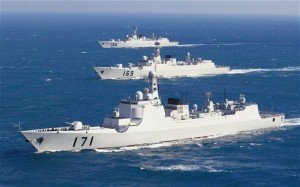Special to WorldTribune.com
Gregory R. Copley, GIS/Defense & Foreign Affairs
China — the People’s Republic of China — has been accused, as 2014 and the Year of the Horse dawn, of aggressively stepping out of its geographic constraints and seeking territorial hegemony over areas beyond those associated with Chinese sovereignty, as well as over areas to which it could claim some historical links. Many officials of the states in the Pacific and Indian Ocean regions have expressed concern and, often, outrage. Not least those of the United States.

What were they expecting?
The growth of the PRC as a strategic power was reluctantly only acknowledged in recent years in the U.S., and then accepted on the basis that, well, the PRC would take decades to “catch up” with the U.S. militarily. The rapid momentum of the PRC, then, in the past year has shaken many external observers, who are uncertain how to react, or even how they could or should react.
The concern is less over the military, technological, and financial capabilities evolving in the PRC than over the nakedness and apparent confidence with which its strategic assertiveness has been demonstrated, particularly in the East and South China seas.
Again: what was the world expecting?
And what have the states in the region been doing to protect their own interests? In reality, very little; it has been “business as usual” for states other than the PRC, often accompanied by handwringing about the economic downturn. (“I cannot worry about an existential challenge because I’m too busy worrying about paying the light bill.”)
It is clear that 2014 is likely to be a decisive year in the establishment of a new global strategic framework, for many reasons. The primary facet, however, is that the world has polarized once again into two principal camps: now it is the U.S. and the PRC. We cannot assume that we can talk of “the U.S.-led West” and “the PRC-led bloc”: How the two powers will build their blocs of supporters cannot yet be determined. It certainly cannot be taken for granted that alliances will be as they were before.
The U.S. Barack Obama administration’s “Pacific pivot” strategy was claimed to be — when it was projected in late 2011 — to throw the preponderance of U.S. political and military weight into a strategy which would contain and constrain the PRC in the Western Pacific. By the time of President Obama’s State of the Union address to the U.S. Congress in January 2014, the initiative still lacked energy and focus. But what was clear was that the U.S. had — as this writer has asserted — abandoned the Atlantic and Europe from the start of the Obama term in office. And much of Europe has abandoned the U.S.
The shakeout of allies of the U.S. and the PRC will occur as their relative strengths and failings emerge in the coming decade. Russia may, or may not, find comfort with the European Union states (and the EU is by no means stable). Iran and the Arabian Peninsula states may or may not retain their strategic momentum. India may have nowhere to go but into alignment with the U.S. But perhaps Russia may reappear as a strategic partner for New Delhi? Russia may or may not find strategic accord with the PRC, although it has a great interest in seeing an integrated Eurasian continental economic zone.
So what are some of the strategic factors of import?
1. The PRC is thinking along classical nation-state lines; a Westphalian and, in a sense, physical approach, while the U.S. and much of Europe is acting as though classical geopolitical thinking and the Westphalian nation-state era has ended. As I indicated in my recent book, UnCivilization: Urban Geopolitics in a Time of Chaos, the newly-emerging pseudo-city-states have lost control over (or interest in) the old nation-states of which they were once part, but — as with the Hellenic city-states and those of medieval Italy — they are vulnerable to old fashioned exercises of sheer power. So in this regard, the PRC is thinking as the U.S. (and other great empires) once successfully did: it is focusing on territory, self-sufficiency, and comprehensive power. This gives Beijing enormous momentum, because the PRC has a strategic concept of itself.
2. The disadvantage, in some senses, for the PRC is that, as a traditionally-oriented power, it is focusing on the attributes of military power which are now becoming obsolete. It is spending heavily on catching up with the U.S. in areas such as carrier battle groups, ballistically-delivered nuclear weapons, and prestige space projects (as opposed to targeted space programs). These prestige projects have some strategic weight (as Stefan Possony said: Prestige is the credit rating of nations). They act as an umbrella for strategic projection; they add to the coercive power of the state. But the next-generation of weapons may be more decisive if applied well: cyber warfare and its variants, in particular. Of course, the PRC is also extremely active in this arena. But those concerned about the PRC would be best advised to think innovatively about weapons which would end-run the dreadnaughts of the various People’s Liberation Army.
3. The PRC is thinking holistically about the global strategic framework; the U.S., the EU leaders, and those of Japan, Australasia, and the Republic of Korea, etc., no longer are. This means that the PRC is thinking creatively; the others, like the U.S., are coasting on a linear extrapolation of their past practices, while focusing on “entitlements”, which are the spending of strategic capital, not the building of it.
Absent a conscious transformation of thinking — a rising to the challenge by the U.S. and “the old West” and India — the Year of the Horse will see the PRC confirm its own “Monroe Doctrine” over its region. That would be a difficult change to reverse.

You must be logged in to post a comment Login